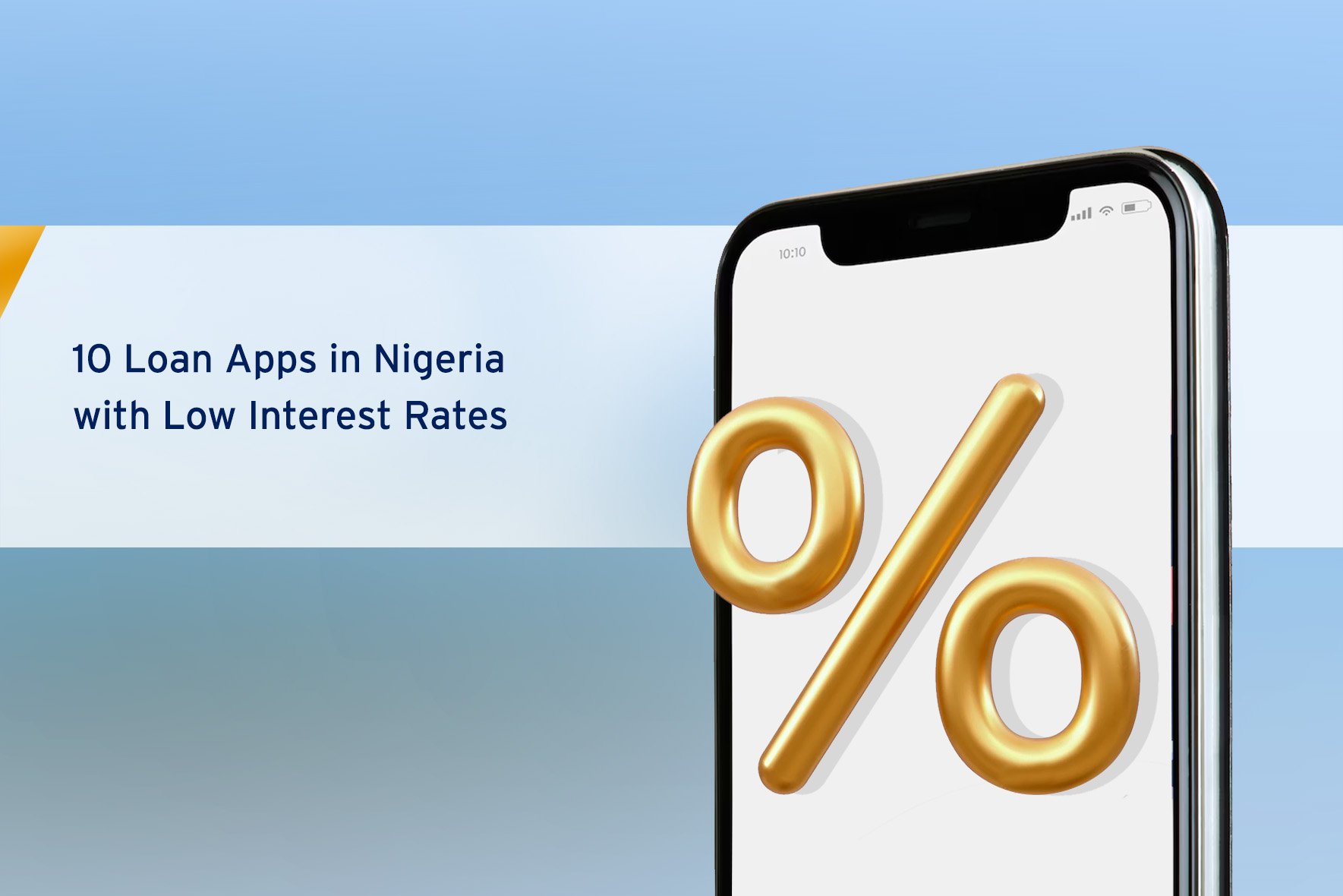
10 Loan Apps in Nigeria with Low Interest Rates
Author Taiwo Temitope-Adesope
Loan apps in Nigeria provide a quick and convenient way for individuals to access loans, sometimes with low interest.
Easy and fast to access, loan apps allow you to apply for and receive funds within a short period, often within minutes or hours.
This is unlike traditional banks that require a lengthy application process and can take days or even weeks to approve and disburse loans.
Loan interest rates in Nigeria can vary depending on the type of loan and the lender. However, here are some general ranges for different types of loans:
However, whether you are taking a personal loan, a business loan or even a student loan, one thing is certain; you have to pay interest.
Interest rates can vary widely among different lenders and borrowers.
How do loan apps work?
Loan apps work in a simple and straightforward manner. To qualify to receive a loan via an app, you will need to take the following steps.
1. Download and install the loan app from your app store or visit the loan app's website.
2. Register on the app by providing your personal details, including your name, phone number, and email address.
3. Complete the app's registration process by verifying your phone number and providing any other required information.
4. Choose the loan product that you want to apply for and enter the loan amount and repayment period.
The loan app will then evaluate your application and determine your creditworthiness by analysing your financial data and credit history.
If your loan application is approved, the loan app will disburse the funds into your account.
It is important to read and understand the terms and conditions of the loan app and the loan product you are applying for, including the interest rates.
10 loan apps in Nigeria with low-interest rates
Interest rates for loans in Nigeria may vary depending on the loan amount, repayment period, and credit score of the borrower.
It is important to carefully read and understand the terms and conditions of the loan before applying.
Some of the loan apps in Nigeria with low interest rates include.
1. Carbon
Carbon offers loans ranging from ₦1,500 to N1 million with interest rates starting from 5%. The loan repayment period is from 3 to 12 months.
2. FairMoney
FairMoney offers loans up to N500,000 with monthly interest rates that range from 2.5% to 30%.
Loan amounts range between ₦1,500 to ₦3,000,000. Also, the loan repayment period is between 1 to 6 months.
3. Renmoney
Renmoney offers loans up to N6 million with interest rates starting from 2.76% per month. The loan repayment period is from 3 to 24 months.
4. KiaKia
A peer-2-peer lending platform, KiaKia offers loans up to N500,000 with interest rates starting from 0.6% per day.
The loan repayment period is from 7 to 30 days.
5. Palmcredit
Palmcredit offers loans from NGN10,000 to NGN 300,000 with a flexible repayment between 91 days to 365 days.
With no collateral, no paperwork, and secure platform, Palmcredit’s loans come with an Annual Percentage Rate (APR) from 24% to 56% or an interest rate of 4% per month.
6. Aella Credit
Aella Credit’s loan size ranges from about N1,500 to N1,000,000. Loan tenors vary per individual but are usually within a month or three months repayment period.
Interest rates with Aella Credit start from 4% per month.
7. Specta
A product of Sterling Bank, with Specta, you can access a personal loan amount up to a maximum of N2 million naira.
The interest rate charged varies from 25.5% pa to 28.5% pa.
This brings it to about 2% interest rates monthly.
8. QuickCheck
QuickCheck offers loans up to N500,000 with interest rates starting from 2.5% per month. The loan repayment period is from 30 to 180 days.
9. Page Financials
Page Financials offers loans up to N5 million with an interest rate of 3.76% charged flat per month.
10. Branch
Branch offers loans up to N200,000 with interest rates starting from 1.7% – 17.6% monthly interest.
The loan repayment period is from 4 to 40 weeks.
Factors that determine interest rate
There are several factors that can determine the interest rate for a loan. These can include:
● Credit score
The credit score of the borrower is one of the most important factors that lenders consider when determining the interest rate. A higher credit score generally indicates a lower risk borrower and can result in a lower interest rate.
● Loan amount
The amount of the loan can also affect the interest rate. Generally, larger loans may have a lower interest rate compared to smaller loans.
● Loan term
The loan term is the length of time in which the borrower is expected to repay the loan. Loans with longer repayment terms may have a higher interest rate compared to loans with shorter repayment terms.
● Collateral
If the loan is secured by collateral, such as a car or a house, the interest rate may be lower as the lender has some security in case the borrower defaults on the loan.
● Income
The income of the borrower can also affect the interest rate. Higher income borrowers may be able to secure a lower interest rate compared to lower income borrowers.
● Inflation
Inflation can also impact interest rates. If inflation is high, lenders may increase interest rates to compensate for the reduced purchasing power of the money they are lending.
● Market conditions
Interest rates may also be affected by market conditions, such as supply and demand for credit, economic growth, and the actions of central banks.
Tips for getting the best low interest loans
Qualifying for a low-interest loan in Nigeria typically depends on several factors such as credit score, income, debt-to-income ratio, and other financial factors.
Here are some tips that can help you qualify for a low-interest loan:
● Credit score
Maintain a good credit score, Lenders generally offer lower interest rates to borrowers who have a good credit score. Therefore, it's important to maintain a good credit score by paying your bills on time, keeping your credit utilization low, and monitoring your credit report regularly.
● Debt-to-income ratio
Reduce your debt-to-income ratio. Lenders prefer borrowers who have a low debt-to-income ratio, which is the amount of debt you have compared to your income.
To improve your debt-to-income ratio, try to pay off your existing debts, and avoid taking on new debts.
● Income
Have a stable source of income. Lenders prefer borrowers who have a stable source of income, such as a regular job. If you have a steady income, it shows lenders that you are less likely to default on your loan.
● Shop around
Different lenders offer different interest rates, so it's important to shop around and compare loan offers from different lenders.
This is where nairaCompare comes in. With our online loan comparison tool, you can compare interest rates, fees, and other terms and conditions.
● Provide collateral
If you have collateral, such as a car or a house, you may be able to qualify for a lower interest rate loan. Collateral provides security for the lender, which can reduce the risk of default.
Overall, the key to qualifying for a low-interest loan is to demonstrate to the lender that you are a low-risk borrower. By following these tips, you can increase your chances of qualifying for a low-interest loan.
About Author

Taiwo Temitope-Adesope
Taiwo is a passionate storyteller and strategist dedicated to empowering women and crafting compelling narratives. A First-Class graduate in Mass Communication from Covenant University, she specializes in writing, public relations, and digital marketing. As a Content Manager at Suretree, she drove a 50% increase in web traffic through SEO and boosted website engagement by 60% in just four months. Her leadership experience includes serving as Public Relations Officer for the Covenant University Student Council and contributing to impactful volunteer initiatives. With expertise in strategic thinking and business acumen, Taiwo continues to create stories that inspire confidence and imagination.









